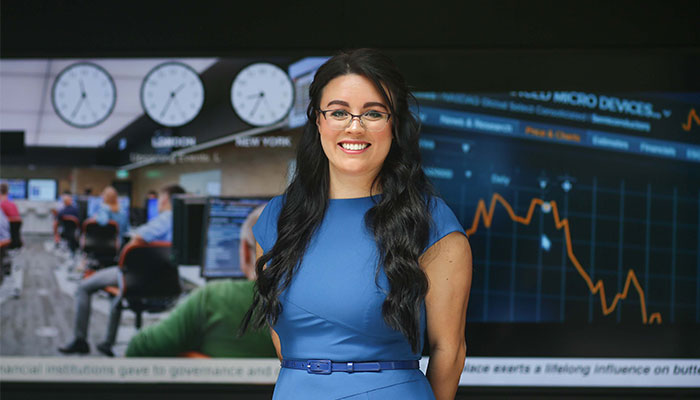The metaverse is the next frontier in digital evolution and consists of digital spaces where people socialise, play, learn and spend money.

Professor Jana Bowden from the Department of Marketing at Macquarie Business School, says everything you do in the real world can be done in metaverse platforms such as Roblox, Fortnite, Sandbox and Decentraland.
The metaverse is also revolutionising retail by blending physical and virtual realities, and enabling consumers to interact with brands, products and other consumers in ways that transcend traditional digital and physical experiences.
"Consumers can drink a virtual beer together, try on their favourite shade of lipstick, enjoy virtual concerts from the comfort of their home and even take a test ride in a car," Professor Bowden says.
Brands such as Nike with Nikeland and Gucci with its Gucci Garden, both hosted by the Roblox platform, offer interactive and immersive experiences designed to deepen consumer engagement. Other major brands including Disney, Zara, Louis Vuitton, Adidas, Burberry, Coca-Cola, Vans, Balenciaga, BooHoo and Clinique also have virtual offerings.
The metaverse has more than 600 million users worldwide, and 80 per cent of them are under 16 years of age.
Consumers can drink a virtual beer together, try on their favourite shade of lipstick, enjoy virtual concerts from the comfort of their home and even take a test ride in a car.
An estimated 22 per cent of Australians are in the metaverse in 2024 and this is projected to reach 61 per cent by 2030. Bloomberg predicts that the metaverse will be worth $800 billion by 2024.
As a bustling new marketplace for brands, the global metaverse advertising industry is projected to grow by 315 per cent and reach a value of $7.5 billion by 2030.
"This growth is being driven by increasing consumer demand for immersive and interactive brand and advertising experiences," Bowden says.
The metaverse's largest Christmas market takes place from December 6 to 22 and is expected to attract 1.3 million visitors.
Bowden says shoppers will be able to buy and sell both real and virtual products such as apparel, food, electronics and non-fungible tokens (NFTs) as well as visit fairgrounds to enjoy virtual rides, waterparks and virtual movies.
"Metaverse empowers people to experience what they might not be able to achieve in the real world," Professor Bowden says. "For example, a person with physical disability can enjoy a mountain hike in the metaverse, or a simple experience such as walking around a mall unassisted."
What do customers want
Professor Bowden says consumers crave engagement and the metaverse with its advancing technology ushers in the possibility of a new customer experience which may become indistinguishable from our physical reality.

"By leveraging advanced technologies such as Web3, blockchain, and NFTs, retailers create immersive shopping experiences that blend the physical and virtual worlds," she says.
"Consumers can immerse themselves in virtual environments that replicate physical stores, browse products, try them on virtually, and interact with virtual sales assistants and real sales assistants."
Professor Bowden says the metaverse offers massive potential for brands to enhance brand capabilities, create novel experiences and reimagine how they connect with customers.
Despite the growing importance of the metaverse to retailers, little is known about how brands should build their metaverse customer experience.
New research by Dr Syed Rahman from the Department of Marketing, Dr Noman Chowdhury, Professor Jamie Carlson and Professor Bowden set out to find out what customers want in virtual worlds.
Their paper "Metaverse platform attributes and customer experience measurement", published in the Journal of Retailing and Consumer Services, found that deep immersion and interactivity enhanced the overall customer experience, making it more engaging for consumers.
Professor Bowden says customers want their metaverse experience to tick 10 experience boxes, ranging from being efficient, immersive and interoperable across platforms to ensuring privacy, supporting product trial, facilitating buying and selling and fostering a close sense of community.
"A retailing experience that delivers on these factors will meet and exceed customer expectations and in turn will drive customer satisfaction, increase dwell time and encourage customer return," she says.

Jana Bowden, pictured, is a Professor in the Department of Marketing at Macquarie Business School.






